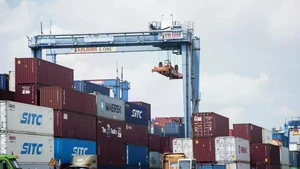Which, issues related to support policies for businesses, the burden of specialised inspection procedures, and the lack of consistency between laws, are currently inadequacies which have been reflected by the business community for many years but have not been completely addressed.
Therefore, it is necessary to "clear" the bottlenecks to support businesses as soon as possible, to create a favourable business investment environment for enterprises and become the growth engine of the economy. This is also a practical desire of the business community.
Overlap in execution
According to VCCI, in 2022, policy and legal development activities in Vietnam witnessed some main "flows", such as policies to cope with the impacts of the world economy, which are reasonable and quite flexible.
Policies related to support and recovery after the pandemic continued to be promoted, which has contributed to helping businesses overcome difficulties; policies related to digital platforms continued to be improved; administrative procedure reform activities, and cutting compliance costs continued to be promoted.
In 2022, state agencies at the central level issued 636 legal documents, including 12 laws of the National Assembly, three ordinances of the National Assembly Standing Committee, 131 decrees of the Government, 28 decisions of the Prime Minister and 462 circulars of ministries.
Compared with the average of the years, the total number of documents and the number of each type of text evaluated tended to decrease.
The business community appreciated the reduction of documents, procedures and conditions in the business. The State's policies and administration have responded well to the impact of the world economy, reasonably and flexibly.
For example, cutting taxes on environmental protection twice, and reducing the preferential import tax (MFN) from 20% to 10% to control gasoline prices, to control inflation.
Along with that, reducing VAT from 10% to 8% to support businesses to recover after the Covid-19 epidemic, and a 2% interest rate support package for businesses through the commercial banking system.
At the same time, other policies related to support and recovery after the pandemic are also continuing to be promoted, which has contributed to helping many businesses overcome the difficult period.
This showed that the work of building institutions and policies is still being carried out more actively, meticulously and carefully than before, by state agencies.
However, according to Nguyen Minh Duc, an expert from the Legal Department of VCCI, the Government has created significant advantages for the business community, but there are still some problems that need to be re-evaluated in the management mechanism and perfecting policies such as: "land auction and depositing of auction winning enterprises, including violations in private bond issuance".
These activities have had a great impact on the economy, causing other impacts on the business investment environment.
The business community is also reflecting a lot on the situation of contradictions, overlaps and obstacles, in regulations related to business investment, forming a bottleneck in the investment environment.
There is a phenomenon that when there is a negative impact on the market, the first reaction of the management agencies is to "tighten", even though the impact of this measure on the market has not been carefully assessed.
Therefore, in addition to businesses needing to forecast changes in legal regulations, they are very concerned about legal risks. Because the issue of high legal risk will mean that business investment activities become more difficult and less favourable.
Reducing legal risks for businesses
The State has also taken many measures to overcome policy inadequacies by reviewing and amending regulations that cause problems.
For example, in 2020, the Working Group to review legal documents of the Prime Minister reviewed 11 groups of business-related issues, and at the beginning of 2022, the National Assembly issued a law, to amend eight business laws to remove obstacles for some investment activities.
However, in the view of economic experts, these activities are only "solutions" in nature, correcting a few "defects" in the "tops", without considering the whole "roots" of the problem, in the legal document system.
According to VCCI's survey, the proportion of enterprises that can predict changes in the central legal regulations tended to decrease. Nine years ago, this rate was about 15.8%, but by 2021, the rate was less than 5%.
When divided by business field, it shows that enterprises in the field of commerce and services have the lowest level of predicting the legal impact on production and business.
Only 31% of businesses in this field said they can "always" predict change, but up to 43% of businesses "never" predict it.
Sharing about the confusion of businesses with laws that directly affect investment activities, President of the Vietnam Association of Construction Contractors Nguyen Quoc Hiep said, that real estate investment alone has about approximately 12 laws with direct impact, but the laws have inconsistent handling, so projects, businesses and law enforcement agencies face difficulties and do not know how to handle cases of overlapping laws.
Currently, businesses, especially large-scale ones, are likened to heavy ships that cannot brake quickly.
Therefore, the State needs to research solutions to reduce legal risks by not having sudden and extreme changes in policy promulgation and implementation.
Although knowing the stability of the law is very important, in the context of socio-economic conditions, if there are continuous changes, it is not possible to require an old legal system, but it is necessary to regularly monitor and adjust it, with a roadmap for businesses to adapt, to overcome inadequacies and problems.
Each adjustment policy should be evaluated seriously and scientifically, instead of just being formal and perfunctory.
In particular, it is necessary to strengthen consultation with enterprises when drafting relevant legal documents, plans and international commitments, thereby, contributing to creating a more favourable environment for business investment and "clearing" policy "bottlenecks" for businesses in the coming time.
















